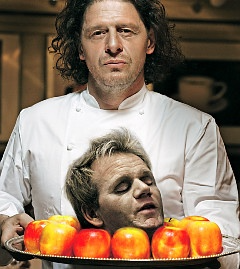
Long before Gordon Ramsay became a household name, he was a young chef with raw talent, relentless drive, and an unshakable hunger to prove himself. That hunger led him straight into the orbit of Marco Pierre White — the first British chef to earn three Michelin stars, and a man whose kitchen was as infamous for its punishing intensity as it was for its culinary brilliance. What followed was a mentorship that would test Ramsay’s limits, shape his career, and nearly break him in the process.
The stories from Ramsay’s early years under White’s command have become the stuff of culinary legend — and cautionary tale. Marco was larger than life: charismatic, wildly talented, and utterly unforgiving. His kitchens were pressure cookers in every sense, and for a young Ramsay, it was both a dream opportunity and a trial by fire. The skills he learned were invaluable — precision, artistry, and the uncompromising standards that would define his own career — but the cost was steep. White’s kitchen wasn’t just a place to cook; it was a battlefield.
The clashes between mentor and protégé were inevitable. Ramsay, never one to back down, found himself pushed to emotional extremes. There are accounts — some confirmed, some whispered in industry corners — of shouting matches, intense confrontations, and moments where the human side of cooking was almost entirely consumed by the pursuit of perfection. In the end, their professional relationship combusted spectacularly, with accusations, tears, and a parting that left scars on both sides.
But here’s the twist: Ramsay didn’t just survive Marco Pierre White — he carried the lessons forward and transformed them. The harshness of White’s mentorship became, in Ramsay’s own kitchens, a tempered version of discipline. Yes, he brought the fire, the famous tongue-lashings, and the refusal to accept mediocrity, but he also injected something White rarely showed — mentorship with long-term investment in people’s growth. Many chefs who’ve worked under Ramsay speak of him years later with gratitude, crediting him for giving them the tools, confidence, and resilience to thrive on their own.

It’s impossible to separate Ramsay’s success from the crucible of his years with White. In surviving that environment, he not only sharpened his culinary skillset but also developed a mental toughness that would allow him to navigate television fame, business empires, and the constant scrutiny of the public eye. If Marco Pierre White was the storm, Gordon Ramsay was the ship that refused to sink — battered, tested, but ultimately emerging into calmer waters with a clearer vision of the chef, and man, he wanted to be.
And maybe that’s the hidden truth: without Marco Pierre White, the world might never have met this Gordon Ramsay — the one who can command a kitchen with fire and fury, yet step away from the pass to hug his children, champion young chefs, and prove that survival isn’t just about withstanding the storm… it’s about learning how to navigate through it.